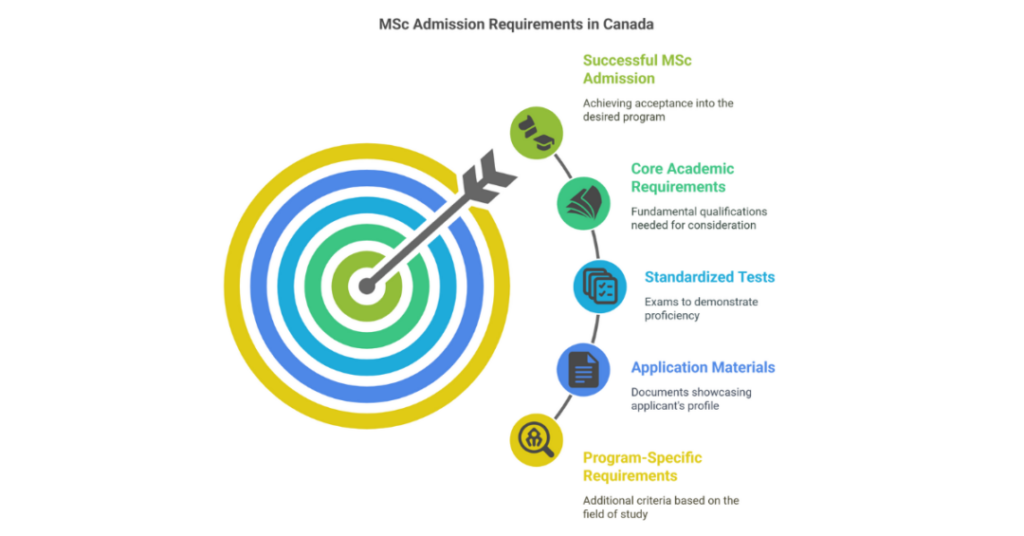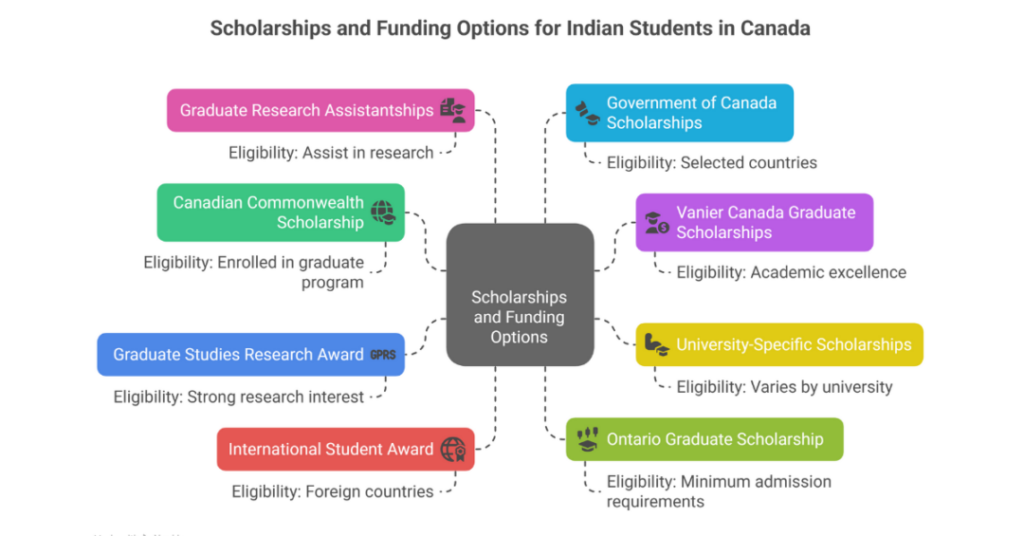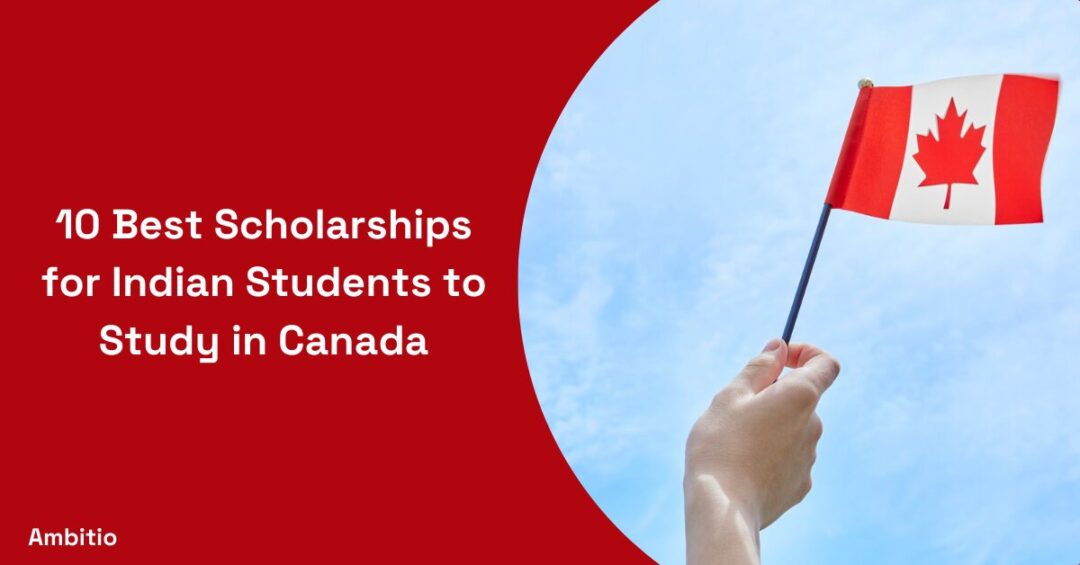11 June 2025
7 minutes read
10 Top Master of Science Courses in Canada for Indian Students

Key Takeaways
- Master of Science courses in Canada offer excellent academic and research opportunities at top universities, making Canada a preferred destination for Indian students.
- Graduate programs in Canada provide various scholarships and funding options to support international students financially.
- Completing an MSc degree in Canada prepares students for diverse career paths in research, industry, and entrepreneurship.
Did you know that over 120,000 international students are currently pursuing graduate studies in Canada? For Indian students, selecting the right Master of Science (MSc) course is often daunting. With countless universities offering diverse programs, navigating through the eligibility criteria, tuition fees, and scholarship opportunities can be overwhelming.
However, focusing on the best-fit programs, such as MSc in Computer Science or Environmental Science, can simplify the process. This blog aims to guide you through Canada’s top MSc courses, ensuring a smoother study abroad journey.
Why Indian Students Prefer Canada for M.Sc Programs?
Indian students prefer Canada for MSc programs due to its world-renowned universities offering diverse graduate programs in fields like Computer Science and Environmental Science. With English as the primary language of instruction, students must meet specific eligibility criteria, including proficiency tests such as IELTS or GRE.
Many Canadian universities provide thesis-based MSc courses, independent research opportunities, and strong faculty support. Additionally, scholarships and work experience opportunities make Canada a top choice for students seeking an advanced degree in a global academic environment.
10 Popular Master of Science Courses in Canada
Canada is home to numerous top universities and colleges offering a range of Master of Science (MSc) programs. Indian students often prefer studying in Canada due to the global recognition of its universities, which provide high-quality education, diverse fields of study, and research opportunities.
With English as the primary language of instruction, students must demonstrate proficiency through exams such as IELTS or GRE. Additionally, many programs have specific admission requirements for graduates and offer various scholarships. Below is a list of 10 popular MSc program offered in Canada:
| Program | University | Field of Study | Eligibility Requirements |
|---|---|---|---|
| Master of Science in Computer Science | University of Toronto, Dalhousie University | Computer Science | IELTS/TOEFL, Undergraduate degree in related field |
| Master of Science in Environmental Science | University of British Columbia, McGill University | Environmental Science | English language proficiency, research experience |
| Master of Science in Data Science | University of Waterloo, Simon Fraser University | Data Science | GRE, strong CV, relevant academic background |
| Master of Science in Biotechnology | University of Alberta, McMaster University | Biotechnology | Transcript, minimum GPA, application fee |
| Master of Science in Electrical Engineering | University of Calgary, University of Ottawa | Electrical Engineering | IELTS/TOEFL, graduate record examination, research experience |
| Master of Science in Mechanical Engineering | University of Montreal, Dalhousie University | Mechanical Engineering | English language proficiency, full-time study, GPA |
| Master of Science in Public Health | University of Toronto, University of Alberta | Public Health | Undergraduate degree in health, GMAT/GRE scores, CV |
| Master of Science in Information Technology | Carleton University, University of Victoria | Information Technology | Proficiency tests, undergraduate degree |
| Master of Science in Pharmaceutical Sciences | University of Saskatchewan, University of Toronto | Pharmaceutical Sciences | Minimum grade point average, work experience |
| Master of Science in Business Analytics | Ryerson University, University of Toronto | Business Analytics | Graduate Record Examination, undergraduate degree, CV, English proficiency |
These programs are designed to help students gain in-depth knowledge and research experience, preparing them for career success. Many Canadian universities offer thesis-based MSc courses, enhancing research and academic opportunities. Scholarships, awards, and excellent faculty support are some of the highlights that make Canada an attractive destination for pursuing an MSc degree.
Admission Requirements and Eligibility Criteria for Master of Science degree in Canada for Indian Students
When applying for a Master of Science (MSc) degree in Canada, Indian students need to be prepared to meet the specific admission requirements and eligibility criteria set by the universities.

Canada is home to numerous universities offering a wide range of MSc programs, from Computer Science to Environmental Science, that cater to both international and domestic students. Here’s an overview of the typical requirements to pursue a master’s Degree in Canada:
- Undergraduate Degree: Students must have completed a relevant undergraduate degree (such as a Bachelor of Science or Engineering) from a recognized institution. Some programs may also require specific courses as prerequisites.
- English Language Proficiency: Since English is the primary language of instruction in most Canadian universities, students must demonstrate English language requirements through exams like IELTS or TOEFL. The minimum required scores vary by university and program.
- GRE/GMAT Scores: While some universities in Canada may not require the GRE or GMAT, many graduate programs, especially in fields like Computer Science or Business Analytics, may expect scores as part of the admission process.
- Minimum GPA: Most Canadian universities for MSc programs have a minimum GPA requirement. This typically ranges from 3.0 to 3.5 on a 4.0 scale, but it can vary by university and program.
- Application Fee: Students are required to pay an application fee, which varies by university. This fee is non-refundable and must be paid at the time of submission of the online application.
- Research Experience: For thesis-based MSc programs, research experience or a strong interest in research is often expected. Students may need to submit a research proposal or provide evidence of previous research involvement.
- Transcripts: Official academic transcripts from previous institutions are required. Students may also need to provide a course-by-course evaluation if their undergraduate degree was obtained outside Canada.
- Letters of Recommendation: Most programs require at least two letters of recommendation from academic or professional references who can speak to the applicant’s qualifications and potential for graduate studies.
- CV/Resume: A well-crafted CV that highlights academic achievements, research experience, and any relevant work experience is often required.
- Thesis-Based Program: Some MSc programs in Canada are thesis-based, meaning that students must complete independent research and submit a thesis as part of their degree. This type of program is commonly offered by the faculty of graduate studies at top universities like the University of Toronto or Dalhousie University.
- Scholarships and Awards: Many Canadian universities offer scholarships and awards to international students, which can help reduce the cost of studying. Students should apply for these opportunities once accepted.
- Specific Program Requirements: Each university may have its own additional specific requirements depending on the field of study. For example, the Faculty of Health Sciences at certain universities may have additional requirements for students to pursue MS in Public Health.
By meeting these eligibility criteria and preparing a strong application, Indian students can successfully apply to their desired MSc programs at top Canadian universities.
Cost of Studying MS in Canada for Graduate Students
When pursuing a Master of Science (MS) in Canada, the cost of living is a significant factor to consider for international students, including Indian students. Along with tuition fees, students need to budget for accommodation, food, transportation, and other essential expenses. Below is a breakdown of typical living costs for MS students in Canada.
| Expense | Estimated Cost (CAD) | Details |
|---|---|---|
| Accommodation | 600 – 1,500/month | Costs vary depending on location (university housing, private rentals, etc.). |
| Food and Groceries | 300 – 600/month | Estimated cost for eating out and grocery shopping. |
| Transportation | 80 – 120/month | Public transportation costs or vehicle expenses. |
| Health Insurance | 500 – 900/year | Required for foreign students in most Canadian provinces. |
| Books and Supplies | 500 – 1,000/year | Dependent on program and field of study (e.g., MS in Computer Science). |
| Personal and Miscellaneous | 100 – 300/month | Includes entertainment, clothing, and other personal expenses. |
| Tuition Fees | 7,000 – 29,000/year | Varies by university and program (e.g., MS in Computer Science). |
The overall cost of living depends on the city and lifestyle choices, with cities like Toronto and Vancouver being more expensive. Students are expected to have sufficient funds to cover these expenses, and many universities in Canada offer scholarships and part-time work opportunities to ease financial burdens.
Scholarships and Funding Options for Indian Students to study MSc degree in Canada
Pursuing an MS degree in Canada can be financially demanding for Indian students. However, many universities for MS Course offer scholarships and funding options to help ease the financial burden.

These opportunities can significantly reduce tuition fees and living costs. Below are some of the most common scholarships and funding options available for MS students in Canada.
| Scholarship/Funding | Details | Eligibility |
|---|---|---|
| Canadian Commonwealth Scholarship | Offered to students from Commonwealth countries, including India. | Must be enrolled in a graduate degree program at a Canadian university. |
| Vanier Canada Graduate Scholarships | A highly prestigious scholarship for doctoral students but can be applicable to some MSc programs. | Requires academic excellence and strong research potential. |
| University-Specific Scholarships | Top colleges in Canada offer their own merit-based scholarships for MS students. | Varies by university (e.g., University of Toronto, Dalhousie University). |
| Graduate Studies Research Award | For students pursuing research-focused graduate programs. | Available for full-time MS students with a strong research interest. |
| International Student Award | A variety of awards for international students, including those pursuing MSc degrees. | Available for students from foreign countries, including India. |
| Ontario Graduate Scholarship | A provincial scholarship for graduate students in Ontario. | Must meet the minimum admission requirements of Ontario-based universities. |
| Graduate Research Assistantships | Many Canadian universities offer assistantships for research work. | Students are expected to assist in research as part of the funding. |
| Government of Canada Scholarships | Offered by the Canadian government for international students. | Available for graduate students from selected countries, including India. |
These scholarships are highly competitive, so Indian students are encouraged to apply early and meet all eligibility criteria. Many universities for MS in Canada also offer work-study options to further support students financially.
Career Opportunities After Master of Science in Canada
After completing a Master of Science in Canada, students have numerous career opportunities. Canada universities prepare graduates for roles in research and development, particularly in tech, engineering, and science fields. Graduate programs may include industry placements, helping students transition to full-time jobs in sectors like IT, pharmaceuticals, and consulting.
Graduates can also pursue academic careers or even entrepreneurship, with Canada’s supportive environment for innovation. A university’s Master of Science degree provides a strong foundation for diverse, high-demand careers.
Conclusion
Pursuing Master of Science courses in Canada provides students with exceptional opportunities to excel in their chosen fields. Whether you’re looking for academic excellence, research opportunities, or industry placements, Canada universities offer graduate programs that prepare students for successful careers. Completing a master’s degree in Canada ensures you receive a world-class education and excellence in research, while also offering flexibility to full-time students.
Ambitio is here to help you navigate your journey, from building a standout profile to guiding you through application fees and eligibility requirements. Join Ambitio to unlock your future in Canada – we’ll help you find the best fit for your postgraduate dreams!
FAQs
What are the basic admission requirements for master of science courses in Canada?
A four-year undergraduate degree with a minimum mid-B average from a recognized institution is generally required for master of science courses in Canada.
How long do master of science courses in Canada typically take to complete?
Most master of science courses in Canada take between one and two years to complete, depending on the program and university.
Are there part-time options for master of science courses in Canada?
Some universities offer part-time options for master of science courses in Canada, but international students should check their study permit conditions before enrolling part-time.
What types of specializations are available in master of science courses in Canada?
Master of science courses in Canada offer specializations in fields like Computing Science, Health Sciences, Information Technology, Business Analytics, and Big Data Analytics.
Is financial support available for students in master of science courses in Canada?
Many universities provide guaranteed funding or scholarships for thesis-based master of science courses in Canada, but not all programs guarantee funding for every student.
Do master of science courses in Canada require a thesis?
Some master of science courses in Canada are thesis-based, while others may offer course-based or project-based options, depending on the university and program.
Can international students apply for master of science courses in Canada?
Yes, international students are welcome to apply for master of science courses in Canada and should ensure they meet admission and visa requirements.

You can study at top universities worldwide!
Get expert tips and tricks to get into top universities with a free expert session.
Book Your Free 30-Minute Session Now! Book a call now




























